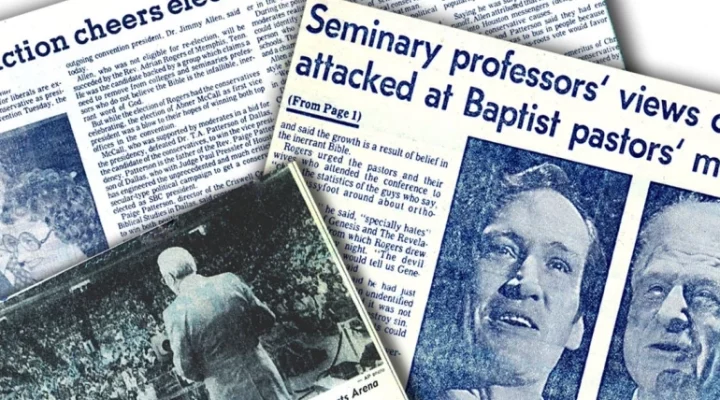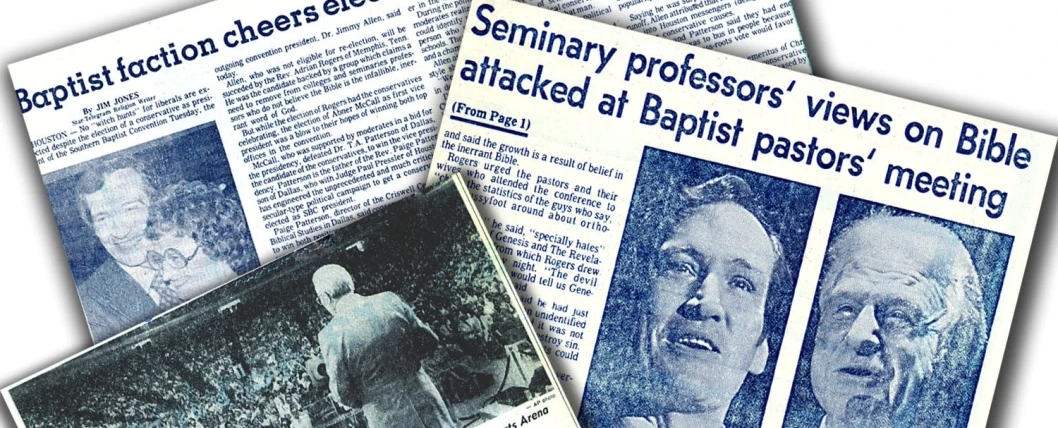Ralph Elliott, the seminary professor whose commentary on Genesis became symbolic of the battle over biblical literalism in the Southern Baptist Convention, has died at age 97.
Elliott died Sunday, Oct. 23, in Paoli, Pa. A family funeral service was held Thursday, Oct. 27.
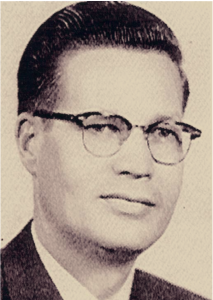
Ralph Elliott
In 1957, Elliott was the first faculty member elected to launch Midwestern Baptist Theological Seminary in Kansas City. There, he completed a book he started in his previous work at Southern Baptist Theological Seminary, a book published under the title The Message of Genesis.
Elliott took a symbolic rather than literal approach to Genesis by stressing its “theological and religious purpose.” He suggested alternative views on the Bible’s meaning about the creation of man, the global flood and the supernatural destruction of Sodom and Gomorrah.
That alarmed biblical literalists in the SBC, who believe the first 11 chapters of Genesis are literal historical accounts, including belief in a creation that happened in six literal, 24-hour-periods.
K. Owen White, then pastor of First Baptist Church in Houston, refuted Elliott’s commentary with a widely distributed essay titled “Death in the Pot,” based on 2 Kings, 4:40, which labeled Elliott’s book “liberalism pure and simple.”
Fearing the controversy would split the SBC, messengers to the 1962 annual meeting voted to form a special committee to study the 1925 Baptist Faith and Message and bring a report the following year. The committee revised the confession of faith adopted during the fundamentalist-modernist controversy of the 1920s with adjustments that came to be known as the Baptist Faith and Message of 1963. Forty years later, when biblical literalists gained control of the denomination, they revised the faith statement again, a document known as the Baptist Faith and Message 2000.
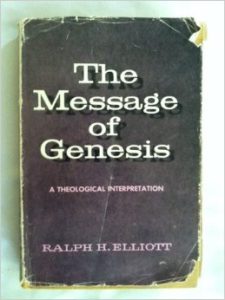 Midwestern’s trustees eventually fired Elliott, not for heresy, but for insubordination after he refused a request not to offer his controversial book for republication. Yet the fire his book sparked only grew stronger.
Midwestern’s trustees eventually fired Elliott, not for heresy, but for insubordination after he refused a request not to offer his controversial book for republication. Yet the fire his book sparked only grew stronger.
Baptist historians trace the roots of the SBC’s “battle for the Bible” to Elliott’s commentary and the intense debate it produced. Paul Pressler, co-architect of the so-called “conservative resurgence” in the SBC, has said the Elliott controversy as it played out at Second Baptist Church of Houston was pivotal in galvanizing his passion to change the direction of the convention.
At Second Baptist, Pressler squared off against John Baugh, a successful businessman who later would become an organizer of the “moderate” Baptist movement and creation of the Cooperative Baptist Fellowship. (The John and Eula Mae Baugh Foundation has been a major contributor to BNG.)
“It was obvious that there were problems (in the SBC), and Ralph Elliott was really the catalyst for me to become concerned about it,” Pressler said in 2014.
After being shunned in the Southern Baptist Convention that had been his home, Elliott spent the rest of his life associated with the American Baptist Churches USA.
Elliott was born March 2, 1925, in Danville, Va. He served in the U.S. Army during World War II, then earned a bachelor of arts degree from Carson-Newman College in 1949 and two degrees from Southern Seminary in 1952 and 1956, the second being a doctorate.
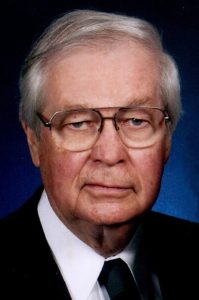
Ralph Elliott
After leaving Midwestern Seminary in 1964, he became pastor of Emmanuel Baptist Church in Albany, N.Y., then First Baptist Church of White Plains, N.Y., then North Shore Baptist Church in Chicago. In 1989 he was named vice president and dean of the faculty at Colgate Rochester Divinity School. He later served as interim president of Andover Newton Theological School and as interim pastor at several Baptist churches in the Northeast, including a return engagement at First Baptist Church of White Plains.
That church’s current pastor, Tim Dalton, remembers Elliott as a compassionate pastor and a great mentor.
“We were both alums of Carson-Newman University. I reached out to him soon after becoming the pastor and we began corresponding with notes over the years,” Dalton said. “In 2016, I asked if I could visit with him, and he was delighted to host me. I drove the five and a half hours to Rochester from White Plains. We talked about many things about his career and life in ministry. In just a few hours of conversation with him, I learned more about the church I was serving than I had gathered in the year and a half prior.
“Sharing his disappointments and joys in our common position, he invited me to share my hopes and dreams for the congregation. I saw the pastor/theologian/mentor sparkle in his eyes,” Dalton remembered.
In the 1970s, White Plains was experiencing a wave of Hispanic immigration, and Elliott cultivated a small group of Spanish speakers who were invited to start a Bible study in Spanish. “This group grew, initially by going through the white pages and calling up people with Hispanic names,” Dalton said. “Ultimately, this Bible study became its own congregation and has remained our sister congregation for over 40 years.”
The two pastors shared a friendship that continued over the years.
“I remember Dr. Ralph H. Elliott with prayerful remembrance today.”
“In his last note to me, during the pandemic, I had been telling him about our congregation growing more diverse culturally and ethnically and we were growing closer together with the Spanish church through some shared ministries. Ralph said, ‘I suspect that this effort is more naturally in the spirit of evolution than revolution. I am impressed, however, that you seem to be going in the right direction. I will watch with interest, and from time to time, with prayerful remembrance.’”
Dalton added: “I remember Dr. Ralph H. Elliott with prayerful remembrance today.”
The small family funeral service held for Elliott Oct. 27 was livestreamed, and many of his former students, friends and parishioners watched online. The service concluded with the hymn “For All the Saints.”
“’For All the Saints’ is such an appropriate hymn for the conclusion of a funeral. This particular saint was a testimony to a theological stream that once flowed within the SBC, and a testimony of the capacity of this stream for flowing outside those banks and resourcing the flourishing of life beyond them,” said Steven Harmon, professor of historical theology at Gardner-Webb University School of Divinity.
Elliott is survived by his wife of 77 years, Virginia C. Elliott; daughters Beverly Rose of Downingtown, Pa., and Virginia L. Elliott of Clifton Park, N.Y.; sister Connie Dalton of Danville, Va; grandson Kevin A. Rose of Union, Ky.; and many nieces and nephews.
Related articles:

